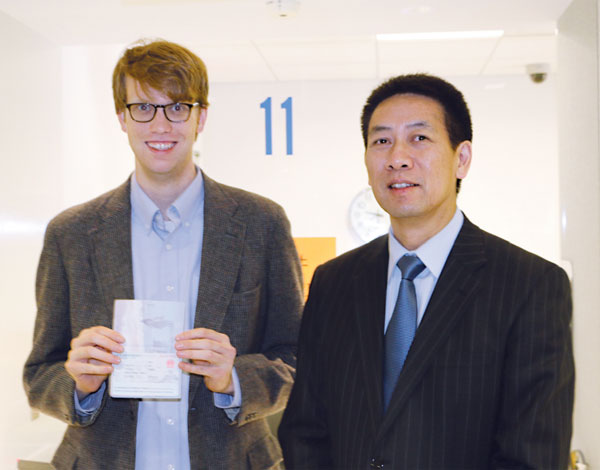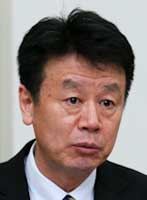 |
|
Edmund Downie (left) receives a 10-year tourist visa from Ruan Ping, consul general and counselor at the Chinese embassy in Washington on Wednesday. It was the first 10-year visa issued to an American at the embassy since China and the US reached an agreement this week. Chen Weihua / China Daily |
China is considering plans to make it easier for foreign experts to come and stay, such as offering them five- or even 10-year multiple-entry visas.
 |
|
Zhang Jianguo, head of the State Administration of Foreign Experts Affairs |
Zhang Jianguo, head of the State Administration of Foreign Experts Affairs and a political adviser, said that this year he will try to make sure that the visa issue will not become a hurdle preventing high-end overseas talent from coming to China.
"Many foreign experts wrote me e-mails to complain about the visa problem. They want five-year or even 10-year multiple-entry permits, which will make their visits easier," said Zhang.
"Most of them are high-end talented people. Some are even Nobel Prize winners. Currently, they can get only one-year or two-year multiple-entry permits, which are not very convenient for them."
In contrast, many other countries have adopted a flexible visa policy for Chinese citizens. "For example, many Chinese businesspeople or even students can apply for 10-year multiple-entry permits in the United States. I think ... we should ensure that top overseas talented people who want to come and work in China can enjoy the same convenience."
According to the draft 13th Five-Year Plan (2016-20), China is going to introduce many types of overseas talent, namely scientists in strategic sectors, those who are able to engage in innovations, breakthrough techniques and developing high-tech industries, and those in emerging disciplines.
Zhang has vowed to remove career barriers for foreign talent and make their lives in China more convenient.
"We will encourage establishing a recruitment mechanism within research institutions, colleges and universities that will take job applications from around the world," he said.
"We will also draft a regulation to guide foreign experts to participate in national science and technology programs, as well as being leaders of important research projects."
Zhang mentioned some specific concerns of foreigners living in China.
"What if they get ill in China? How can the expenses in a Chinese hospital be covered by insurance in China or their commercial insurance bought overseas?
"I know there are very few hospitals that could connect with overseas insurance companies. And this needs policy support from government agencies such as us."